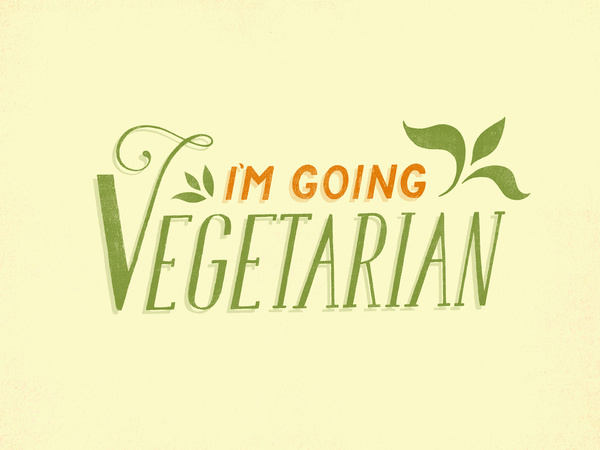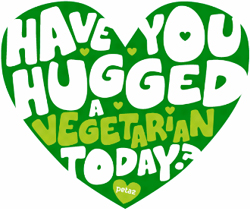Going Vegetarian

http://society6.com/dailydishonesty/im-going-vegetarian_framed-print#12=52&13=54 Society 6
September 30, 2014
“Why would you not eat meat?” The connotation amongst our peers is that the common vegetarian doesn’t eat meat because they are a tree-hugging hippie. But I can assure you that there is more to it than that. As a vegetarian I refrain from eating anything that contains the flesh of an animal. I, personally, decided to make this drastic change in my diet because I realized what I had been consuming. The reasons throughout all vegetarians will be different, whether it is a moral, health, or a religious reason. And the diets will range from all five vegetarian levels.
The first level is a pescatarian. This means that an individual that identifies as a pescatarian will not eat any meat or animal flesh, with only the exception of fish. Many vegetarians would not admit to this being a type of vegetarianism because of the fact that they do consume an animal or the product of an animal. But they may have the same motivations behind their diets. Pescatarian, Elise Borman (11), said that the reason she eats fish is because “[she] didn’t want [her] mom to go crazy while trying to find meals that would be sufficient for [her], while still giving the rest of [her] family the meat dishes they love.”
The second level is a flexitarian. Flexitarians are on a mostly-vegetarian diet, but they may occasionally eat meat. They may have the same reasoning behind sometimes eating meat as some pescatarians do, for the convenience of others. Some families have trouble dealing with their child changing everything they eat, while other families embrace it. What meat-eating families may not realize are the plentiful options for vegetarians of all situations. Having a family barbeque for the big football game? Just buy soy or vegetable-based patties at your local grocery store for your vegetarian family member.
The third level is just a vegetarian. An actual vegetarian will not eat any type of animals but they will eat products that are produced by animals, such as eggs, or dairy products, including cheese, yogurt, and milk. Vegetarian, Dana Duran (11), says, “I’ve always been very passionate about animals and their rights, so it just seemed like the next step for my life.” This seems to be a theme with many vegetarians, which gives us the stereotype of eccentric hippies. But animal rights activists aren’t well represented by the media, with over-the-top activists, such as PETA. Though most vegetarians are not to that extreme.
The fourth level is a vegan. A vegan won’t eat meat of any kind. In addition they will not eat animal produced products. This includes eggs, dairy, and gelatin; gelatin does contain animal-derived ingredients. Most vegans will refrain from eating foods that are made with animal products, such as some sugars and wines. Vegan, Naomi Kolb (11), says this about being a vegan, “Sometimes people ask me if I’m healthy and how I get my protein… and people tell me that humans are supposed to eat meat and drink milk.” Naomi has been a vegetarian since fifth grade and later became a vegan. Asked about any health problems, she replies, “If anything, I’m healthier because of it. I had my blood work done last year and all my iron levels and stuff like that are totally normal.”
The fifth level is a raw vegan. Their diet consists of unprocessed foods that haven’t been heated (above 115 degrees to be exact). They believe that if cooked above this temperature the food will lose the majority of its nutritional value. As a high schooler, this type of diet may affect one’s health because of all the main food groups (along with the amount of sleep) one would be missing, but as an adult the transition seems to be easier.
Becoming a vegetarian was an easy transition for me. Once a person gets used to not having meat in their digestion for a week or two, the temptation lacks. I personally would recommend giving vegetarianism a try. Even for a year, like Karly Kaufman (12) did in 2012. It might change the way you think, eat, and see your environment.






